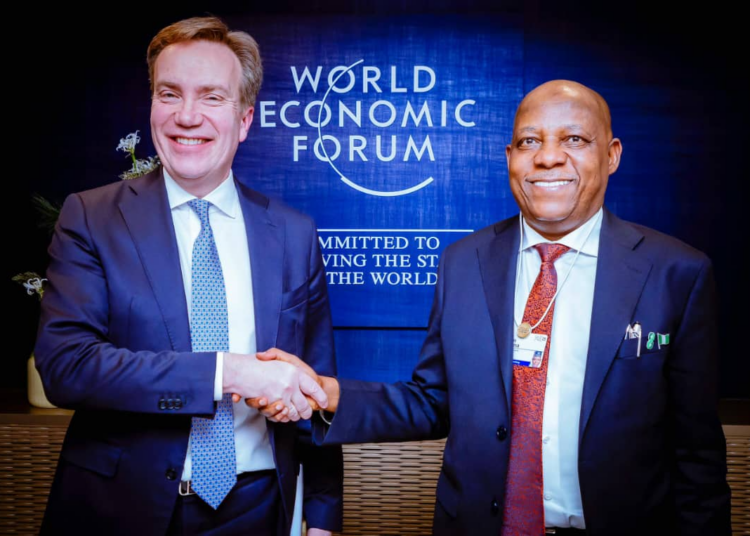I have long passed the stage of caution over being overly adulating of VP Kashim Shettima, having written about him on numerous occasions, right from 2019, when he was Borno State Governor; and in all these years, I have never been so impressed by his eloquence and intellect, as he grasped at full depth of his thoughts, and articulated them into succinct expressions that calmly and boldy delivered his messages to the developed world.
He represented President Bola Ahmed Tinubu at Davos for the World Economic Forum. He was one of the panelists at a session that discussed the solutions to global risks.
The moderator admitted that it was a truly sobering discussion while presenting a very interesting and intellectually studded panel which had: Julian Tate, Provost of Kings College University and columnist at the Financial Times; John Doyle, President/Chief Executive of Marsh McLennan; Martina Cheung, President/CEO of S & P Global, and Vice President Shettima.
One would have thought that Kashim was way in over his head, being joined by an array of the best minds in the world, proffering solutions to global risks, with over 900 experts gathered from around the world to deliberate, and find lasting solutions to globally acknowledged risks and existential threats.
The moderator turned to Shettima and asked him about the damning effects of state-based armed conflict on Africa, as it claims more lives everyday. She did ask him to broaden his lens, and have a take on the issue. I guess she must have been astonished as to how broad his lens were, I was.
He affirmed that “the Ukraine war, the wars in the Middle East, and the Sudan war have compounded our misery as a people. They have disrupted our supply chains, exacerbated our humanitarian challenges, and threatened global peace”. Shettima further added, “there is an incestuous relationship between economy and ecology in Africa. Sudan that used to be the standard bearer of peace and development in Africa has become a basketcase”.
He also added that, “hope springs eternally in the hearts of men, and as members of the same human family, we can find solutions to our challenges. Armed conflicts go beyond state-based conflicts. Boko Haram, ISWAP and banditry, have accounted for 5,000 deaths annually between 2020 and 2024, even though the figures are dropping by about 43 oercent.
Niger, Mali and Burkina Faso all constitute an imploding Sahelian region. Juntas impervious to human reasoning in those countries have made things even worse. We need Nigeria in West Africa, and Egypt in North Africa to serve as stabilising nations. Despite the conflicts between Somalia and Ethiopia, Ethiopia can be a force for good in the horn of Africa. In Southern Africa, South Africa can also be a stabilising force”. Kashim underscored the fact that multilateralism is key as the challenges are global and we need to fuse into one common human family to address them.
When she further prodded him about what multilateralism he was talking about, Shettima replied, “I am talking about organisations like the United Nations, the World Economic Forum and other international agencies for the good of humanity fusing into one, to help proffer solutions. I am an eternal optimist, and I believe we should have a holistic approach to our challenges. Beneath the mayhem of Boko Haram and the annihilism of ISWAP, lies the real cause; extreme poverty. Once we adopt both the kinetic and non-kinetic approach, we can find solutions. Unless we want to engage in an endless war of attrition, military solutions cannot solve our problems. Gender empowerment initiatives investments in education, in healthcare, and in infrastructure, are the least we can do.
“We have to create hope for the youths to create hope for a better tomorrow, so that the madness will evaporate. As a very young continent, the average age is 16.9 and by 2050, we will surpass the US to become the third most populous country in the world. We have this window where our demographic bulge can be harnessed into a demographic dividend, or it will turn into a demographic disaster that will consume all of us.”
Martina Cheung, the President and CEO of S & P Global was so glued in, as she looked on with rapt attention, listening to our VP.
Then came his real message: “Two million Syrians knocking on the doors of Europe led to Brexit. You can imagine having 50 million, cocky, English speaking, swashbuckling Nigerians invading Europe?”
He quoted Warren Buffet as saying, “Do not chase the butterflies, fix your garden and the butterflies will come to you.” Africa has got what it takes, having missed the agricultural and industrial age, we can participate fully in the knowledge age. Digital savvy Africans are in a unique position to drive change in Africa. We have challenges, but those challenges are pregnant with opportunity, Shettima asserted. He added that with the coming of President Donald Trump, there will be some degree of peace around the world, as he is not so obsessed with world dominance.
Shettima remarked that the Middle East crises are losing steam due to Trump, and further predicted that the Ukraine war too will be ended by Trump. The moderator kept asking him questions and Shettima was relentless in his apt and concise responses. He was somewhat representative of the cocky, swashbuckling Nigerians I must add.
Trump’s pro-peace and anti-war disposition may augur well for Africa, and probably help in abating the conflicts in Africa indirectly. Funds as aid to developing countries from the US, even for health, are being probed or stopped. As allegations of certain international agencies supporting or funding terrorists are also being investigated, there will be a drain in their activities, whether those allegations are true or not.
The US and a lot of European countries have adopted anti-immigration stances, making it more difficult for the citizens of Third World countries to emigrate and naturalise in the US and Europe. With these developments, it is in the best interest of the developed world not to interfere in African conflicts, or perhaps, interfere positively, providing support for African multinational joint task forces; ECOWAS; and other similar platforms aimed at curbing state armed conflicts. The more countries like Nigeria, Ethiopia, South Africa and Egypt prosper, the better and more peaceful Africa will be. A more peaceful continent will not implode and burst out to Europe and America, to strain their infrastructure, and create immigration crises. International organisations should look at making Africa a better place, as a solution to the over crowding and over-stretching of their societies and their structures due to immigration exigencies. Shettima was a delight to watch, and his optimism that having true development partnerships to eradicate poverty, as panacea to Africa’s state-based armed conflicts, is actually a nail in the heart of the problem.





